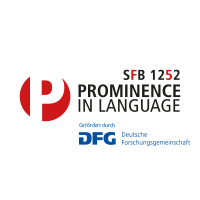
B06 - Aufmerksamkeit und Prominenz in Sprachproduktion und Spracherwerb
Das Projekt beschäftigt sich mit der Frage, wie die Manipulation der Aufmerksamkeit der Sprecher:innen auf einen von zwei Partizipant:innen in einem abgebildeten transitiven Ereignis die sprachliche Beschreibung dieses Ereignisses beeinflusst. Dabei interessiert uns die Interaktion zwischen kognitiver Prominenz und sprachlicher Prominenzmarkierung. Während Phase I des Projekts den Einfluss verschiedener konzeptueller und perzeptueller aufmerksamkeitslenkender Faktoren bei erwachsenen Sprecher:innen untersucht hat, fokussiert Phase II die Entwicklung der Schnittstelle von kognitiver und sprachlicher Prominenz bei Kindern.
Zu den Projektpublikationen
Team


Luisa Geib
Doktorandin B06
Büro: SFB, Luxemburger Str. 299, Raum 2.04E-Mail: lgeib(at)uni-koeln.deTelefon: (+49) 221 470-89911

Lene Siefert
Doktorandin B06
Büro: SFB, Luxemburger Str. 299, Raum 2.04E-Mail: lene.siefert(at)uni-koeln.deTelefon: (+49) 221 470-89911
Publikationen
2024
- Dolscheid, Sarah & Martina Penke. 2024. Animacy and attention play different roles in children’s language production. In Proceedings of the Annual Meeting of the Cognitive Science Society, vol. 46.
- Dolscheid, Sarah, Judith Schlenter & Martina Penke. 2024. Literacy overrides effects of animacy: A picture-naming study with pre-literate German children and adult speakers of German and Arabic. PLOS ONE 19(4). e0298659.
- Gerwien, Johannes, Judith Schlenter, Martina Penke & Agnieszka Konopka. 2024. Effects of event participant preview and patient animacy in sentence production: a cross-linguistic comparison between English and Russian. Discourse Processes.
- Zeyer, Barbara & Martina Penke. 2024. Prosodic prominence and its hindering effect on word recognition memory in German. In Proceedings of the 12th Speech Prosody, 1135–1139. Leiden, the Netherlands. pdf
- Zeyer, Barbara & Martina Penke. 2024. Prosodic prominence does not speed up word recognition in a word-monitoring task with German adult speakers. Glossa: a journal of general linguistics 9(1).
2023
- Dolscheid, Sarah & Martina Penke. 2023. Attention vs. accessibility: the role of different cue types for non-canonical sentence production in German. Frontiers in Language Sciences 2.
- Zeyer, Barbara & Martina Penke. 2023. The processing of prosodic prominence in German. In Radek Skarnitzl & Jan Volín (eds.), Proceedings of the 20th International Congress of Phonetic Sciences, 4071–4075. Prague, Czech Republic: Guarant International.
2022
- Dolscheid, Sarah, Simge Çelik, Hasan Erkan, Aylin Küntay & Asifa Majid. 2022. Children’s associations between space and pitch are differentially shaped by language. Developmental Science: e13341.
- Schlenter, Judith, Yulia Esaulova, Sarah Dolscheid & Martina Penke. 2022. Ambiguity in case marking does not affect the description of transitive events in German: Evidence from sentence production and eye-tracking. Language, Cognition and Neuroscience 37(7). 844–865.
- Schlenter, Judith & Martina Penke. 2022. (How) visual properties affect the perception and description of transitive events. Glossa Psycholinguistics 1(1).
2021
- Esaulova, Yulia, Sarah Dolscheid & Martina Penke. 2021. All it takes to produce passives in German. In Vicenç Torrens (ed.), Syntax processing, 75–107. Cambridge Scholars Publishing.
- Esaulova, Yulia, Sarah Dolscheid, Sabine Reuters & Martina Penke. 2021. The Alignment of Agent-First Preferences with Visual Event Representations: Contrasting German and Arabic. Journal of Psycholinguistic Research.
- Schlenter, Judith, Yulia Esaulova, Barbara Zeyer & Martina Penke. 2021. Effects of agent position and orientation on perception and production. In Proceedings of ExLing 2021: 12th International Conference of Experimental Linguistics, 11-13 October, 213–216. Athens, Greece.
2020
- Dolscheid, Sarah, Simge Çelik, Hasan Erkan, Aylin Küntay & Asifa Majid. 2020. Space-pitch associations differ in their susceptibility to language. Cognition 196.
- Esaulova, Yulia, Martina Penke & Sarah Dolscheid. 2020. Referent cueing, position and animacy as accessibility factors in visually situated sentence production. Frontiers in Psychology 11:2111.
- Penke, Martina & Eva Wimmer. 2020. Verbal short-term memory and sentence comprehension in German children and adolescents with Down syndrome: Beware of the task. First Language, Special Issue: Syntax and Verbal Short Term Memory in Developmental Disorders.
- Schlenter, Judith, Yulia Esaulova, Elyesa Seidel & Martina Penke. 2020. Planning of active and passive voice in German. Proceedings ExLing 2020: 11th International Conference of Experimental Linguistics. Athens, Greece.
2019
- Arslan, Seçkin & Yulia Esaulova. 2019. Information structure. In Martin J. Ball & Jack S. Damico (eds.), The SAGE Encyclopedia of Human Communication Sciences and Disorders. 908-909. Thousand Oaks, CA: SAGE Publications.
- Esaulova, Yulia, Penke, Martina & Sarah Dolscheid. 2019. Describing events: changes in eye movements and language production due to visual and conceptual properties of scenes. Frontiers in Psychology 10:835.
2018
- Asano, Rie, Pia Bornus, Justin T. Craft, Sarah Dolscheid, Sarah E. M. Faber, Viviana Haase, Marvin Heimerich, Radha Kopparti, Marit Lobben, Ayumi M. Osawa, Kendra Oudyk, Patrick C. Trettenbrein, Timo Varelmann, Simon Wehrle, Runa Ya, Martine Grice & Kai Vogeley. 2018. Spring School on Language, Music and Cognition: Organizing Events in Time. Music & Science, 1-17.
2017
- Esaulova, Yulia, Chiara Reali & Lisa von Stockhausen. 2017. Prominence of gender cues in the assignment of thematic roles in German. Applied Psycholinguistics 38. 1133-1172.
- Patterson, Clare, Yulia Esaulova & Claudia Felser. 2017. The impact of focus on pronoun resolution in native and non-native sentence comprehension. Second Language Research 33(4). 403-429.
